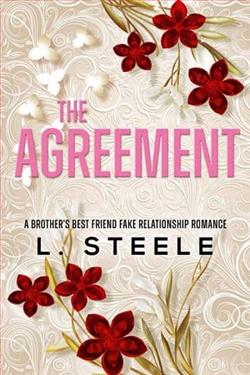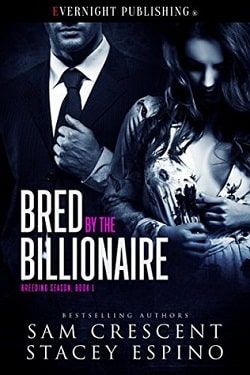Page 5 of Going Home in the Dark
“Well,” said Bobby, “she didn’t have a backstory or a future, so a name would’ve been superfluous. Spencer and I are staying at the Spreading Oaks Motor Hotel. It’s nice. Four stars. We could book you under a name less famous than yours.”
“Not necessary. I’ll have Maud make reservations using her name and credit card.” Maud Pucket was her personal assistant. “I’ll be there by this evening if not sooner.”
“Love you, amigo.”
“Love you, Bobby.”
“Let’s do this for Ernie,” he said.
“For Ernie, mi amigo,” she said.
She didn’t want to go home again, because it wasn’t home. Her inattentive mother had moved to Miami. The grandparents who raised her, Charlie and Ruth, had retired to Palm Springs. She had always been an outsider in Maple Grove. The town itself didn’t inspire even a mild flush of nostalgia. In fact, an intuitive wariness arising from some dark knowledge buried deep within her subconscious warned her off the town whenever she thought of returning there even to see Ernie, which was why he always came to visit her instead.
Inevitably, Rebecca thought of Thomas Wolfe, who had writtenYou Can’t Go Home Again, a massive tome that fell on an unexpecting public in 1940 and was at once said to be a classic of American literature. A film director of Rebecca’s acquaintance, a man with numerous hits to his credit, had spent nine years trying to mount the novel as a movie, almost as long as he spent unsuccessfully trying to mount Rebecca. Although he had been nominated for eight Academy Awards and won three, he wasn’t able to get the project green-lighted at any studio or otherwise raise the financing, not when he had a script that was a faithfuladaptation, not when he reconceived it as a rock-and-roll musical, not when he found a way to give the story a science-fiction edge, and not even when he introduced a terrifying parallel plot about flesh-eating zombies. The title was even more prophetic than the novelist could have known: You can’t go home again, and you can’t even make a movie about not being able to go home again.
Yet Rebecca was going to try to go home again. For Ernie.
3Painting While Unconscious
At three o’clock in the morning, three hours before Ernie Hernishen’s mother called to report that her son was in a coma and not expected to live, Spencer Truedove had been completing a six-foot-high ten-foot-wide canvas, though of course he wasn’t aware of what he was doing. All his paintings were large, anywhere from six feet square to eight feet tall and twelve feet wide, full of drama and color and strangeness. He worked exclusively in a fugue state, though not by choice.
[For those readers who have never heard of a fugue state in the dull kind of fiction they usually read, please allow me to explain. During such a condition, individuals appear to be like you or me, engaged in ordinary tasks, when in fact they are not consciously aware of what they are doing. Upon recovery from this phase, they have no memory of where they have been or what they have done. This might seem to be a convenient excuse for all kinds of outrageous behavior, but in fact it is a condition extensively documented by psychologists and other experts of their ilk. This is not the ideal place to explain how Spencer fell into such a curious career; that moment will come in Chapter Six, after he is on the road to Maple Grove and the momentum of the story is sweeping us right along. However, I felt that I could not just slap you withthe termfugue stateand then merely breeze onward without an explanation.]
So, having completed the painting and come out of his fugue state, Spencer was in his studio, standing before that enormous canvas, perplexed by the fantastic drama and color and strangeness of it. He wondered what he’d intended to convey while he had been slinging all that paint around.
When his smartphone rang, he felt a shiver of dread even before he saw the caller’s name. He was a sensitive artist who sometimes experienced presentiments of impending trouble. Sadly, he lacked the ability to foresee the exact nature of what trouble might be coming; consequently, he was unable to avoid such personal setbacks as when a carjacker stole his EV and drove it through the front wall of a pizzeria, where the battery exploded and melted the pizza ovens. Or as when he’d nearly lost his nose at a Japanese steak house where the tableside chef was poorly skilled with the razor-sharp knives that were used in the flamboyant preparation of a Kobe beef entrée.
Accepting the call, he said, “Mrs. Hernishen, tell me this isn’t bad news.”
“I would never lie to you, Spencer. I would never tell you I have good news when I don’t. Why would you make such an allegation?”
“I wasn’t alleging anything, ma’am. I just had a presentiment of dire news. A foreboding. And I hoped I was wrong.”
“I don’t mean to be fussy, Spencer, but I am older than you and therefore wiser than you. My superior wisdom allows me to say with authority that it is never a good idea to wish away bad news. Best to confront it, deal with it, and move on.”
“I imagine you’re right, ma’am.”
“There is no need to engage your imagination in this matter. You can be certain I’m right. How old are you these days, Spencer?”
“Thirty-five, ma’am.”
“By the time I was thirty-five, I didn’t have to imagine the answer to anything. I knew all the answers by then. A serious person should know the truth of everything by thirty-five. Do you consider yourself to be a serious person, young man?”
“Well, I guess I’m as serious as others of my generation.”
“That’s a terrible thing to say about yourself. Your generation is largely worthless. You must rise above the ruck and mire of their kind. If you can. If you want to. Of course, it is always a matter of ambition and ability. Perhaps the problem is that you possess neither.”
Besides being opinionated and judgmental, Britta Hernishen was also loquacious. [That word might be as unfamiliar to some readers as the termfugue state, but there’s nothing to be done about it now that it has fallen with a thud at the end of the previous sentence and is an immovable impediment to clear meaning.] At dinner, Britta could employ in excess of two hundred words to request that someone pass the pepper, in the process delivering a withering political opinion and a scathing review of a recent novel. At seventy, as a university professor who had been tenured for decades, she had no memory of a time when a student had dared to express an idea or sentiment in opposition to hers.
When required to attend a faculty meeting that promised to be a noisy airing of petty complaints, Britta sat in the back of the room and reread a Virginia Woolf novel while wearing wax ear stopples and humming old Woody Guthrie songs. By those precautions, she rendered herself deaf to the barked and hissedidiocies of other attendees, which was the rare occasion when she didn’t speak.
None of her faults or foibles mattered, for she was Ernie’s mom. Ernie had a big heart. Ernie was kindness personified. To love Ernie was to like his mom or at least tolerate her and treat her with respect. No matter what.
Spencer’s left hand was dry, but his right, with which he held the phone, was already damp with perspiration. He called it the “Britta effect.”
“Now, Spencer,” she said, “if we were to define what we mean by ‘serious,’ you and I would seem to be speaking different languages. However, since you consider yourself to be a serious person, perhaps you will consider a question I have that only you can answer. Please strive to be coherent.”
“I’ll do my best, ma’am.”















